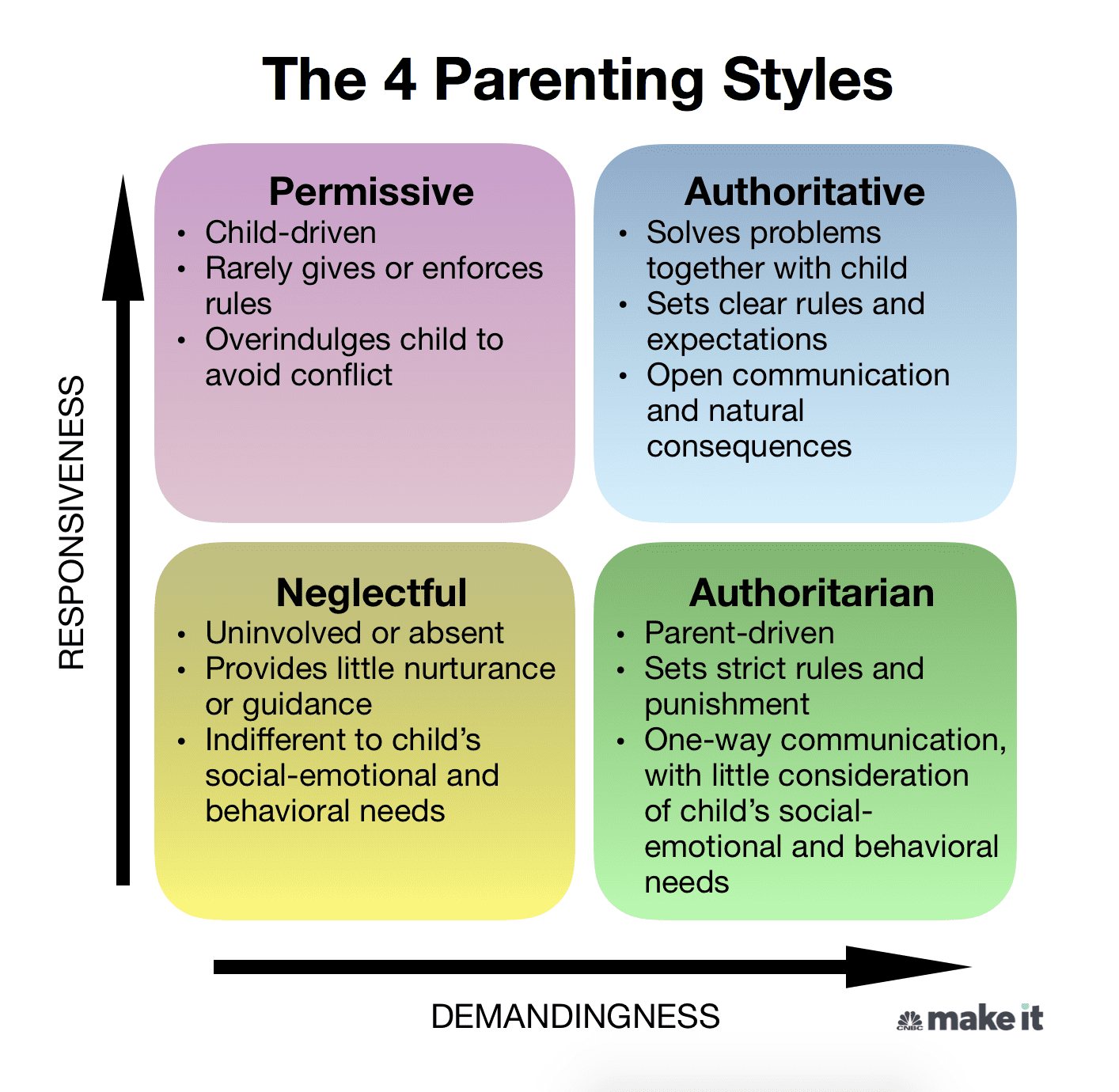
What are the most effective parenting styles?
Share
When it comes to parenting, there are countless parenting styles and approaches out there. But have you ever wondered which one is the most effective? Well, you’re in luck because today we’re diving deep into the world of parenting styles to answer that very question. Whether you’re a new parent looking for guidance or simply curious about the different approaches, this article will provide you with valuable insights and help you navigate the realm of effective parenting styles.
Parenting styles play a crucial role in shaping a child’s development, behavior, and overall well-being. From authoritative to permissive, each style comes with its own set of characteristics and approaches. By understanding the pros and cons of each style, you can make an informed decision about which one aligns best with your values and goals as a parent. So, get ready to explore the fascinating world of parenting styles and discover the most effective strategies for raising happy, healthy, and well-adjusted children. Let’s dive in!
Understanding Parenting Styles: What is the Most Effective Approach?
Parenting is a journey filled with joy, challenges, and important decisions. One of the most crucial decisions parents face is choosing the right parenting style. With so many different approaches to parenting, it can be overwhelming to determine which one is the most effective. In this article, we will explore various parenting styles, their benefits, and how they can impact a child’s development.
The Authoritative Parenting Style
The authoritative parenting style is widely regarded as one of the most effective approaches. Parents who adopt this style are both nurturing and responsive while also maintaining clear boundaries and expectations. They provide guidance and set rules, but they also value open communication and encourage independence. This balanced approach allows children to develop a strong sense of self-esteem, self-discipline, and social competence.
Research suggests that children raised by authoritative parents tend to have higher academic achievement, better emotional regulation, and healthier relationships. By establishing a warm and supportive environment while also maintaining structure, authoritative parents create a secure base for their children to explore the world and develop important life skills.
While the authoritative style is highly effective, it is important to note that it may not be a one-size-fits-all approach. Each child is unique, and parents should consider their child’s temperament and individual needs when implementing any parenting style.
Benefits of the Authoritative Parenting Style
The authoritative parenting style offers numerous benefits for both children and parents. Firstly, it fosters a positive parent-child relationship based on trust and mutual respect. This strong bond allows children to feel secure and confident, which can positively impact their emotional well-being.
Additionally, the authoritative style promotes healthy communication and problem-solving skills. Parents who prioritize open dialogue with their children teach them how to express their thoughts and emotions effectively. This skill set helps children develop strong interpersonal skills, which are crucial for success in various aspects of life.
Furthermore, the authoritative parenting style encourages independence and autonomy. By allowing children to make age-appropriate decisions and take responsibility for their actions, parents empower their children to become self-reliant individuals. This sense of independence instills a strong sense of self-confidence and self-worth in children.
The Permissive Parenting Style
On the opposite end of the spectrum, we find the permissive parenting style. Parents who adopt this approach tend to be lenient and indulgent, often avoiding setting clear boundaries or enforcing consistent rules. While this style may seem relaxed and easygoing, it can have negative consequences for a child’s development.
Children raised in permissive households may struggle with self-control, as they are not accustomed to clear limits and boundaries. Without these guidelines, they may have difficulty following rules and respecting authority figures. Additionally, permissive parenting can lead to entitlement and a lack of accountability, as children may not understand the importance of responsibility and consequences.
The Impact of Permissive Parenting
The permissive parenting style can have long-term effects on a child’s behavior and well-being. Research suggests that children raised in permissive households may exhibit higher levels of impulsivity, lower academic performance, and a greater likelihood of engaging in risky behaviors such as substance abuse.
Without clear structure and guidance, children may struggle with self-regulation and decision-making. The absence of boundaries can lead to feelings of insecurity and confusion, as children may not fully understand their role within the family and society.
It is important to note that occasional flexibility and understanding are essential in parenting. However, a consistently permissive approach may hinder a child’s ability to navigate the world effectively and develop the necessary skills for success.
The Authoritarian Parenting Style
Another commonly observed parenting style is authoritarian parenting. This approach is characterized by strict rules, high expectations, and a focus on obedience. Authoritarian parents often prioritize discipline and control, but they may lack warmth and emotional support.
While authoritarian parenting may produce children who are obedient and disciplined, it can also have negative consequences. Children raised in authoritarian households may experience low self-esteem, difficulty expressing themselves, and a fear of making mistakes. The rigid nature of this parenting style can hinder a child’s ability to develop autonomy and problem-solving skills.
Striking a Balance: The Benefits of Authoritative Parenting
While the authoritarian parenting style may not be as effective as the authoritative style, it is important to recognize that each parenting approach has its strengths and weaknesses. Some children may thrive in a more structured environment, while others may require more flexibility and freedom to explore.
By combining elements of the authoritarian and authoritative parenting styles, parents can strike a balance that meets their child’s individual needs. This hybrid approach allows for clear boundaries and expectations while also fostering a warm and supportive environment. It empowers children to make decisions within appropriate limits, fostering independence and self-confidence.
In conclusion, choosing the most effective parenting style is a deeply personal decision that depends on various factors, including a child’s temperament and needs. The authoritative parenting style stands out as one of the most effective approaches, as it balances nurturing and responsiveness with clear boundaries and expectations. By prioritizing open communication, independence, and mutual respect, parents can create a supportive environment that promotes their child’s healthy development. However, it is important to remember that effective parenting is a continuous learning process, and adjustments may be necessary to meet the changing needs of both parents and children.
Key Takeaways: What is the Most Effective Parenting Style?
- Authoritative parenting, which is characterized by setting clear rules while being supportive and responsive, is considered the most effective parenting style.
- This style promotes a healthy balance between discipline and nurturing, allowing children to develop independence and self-discipline.
- Authoritative parents communicate openly with their children, listen to their thoughts and feelings, and provide guidance rather than strict control.
- Another effective parenting style is authoritative parenting, which is characterized by high demands and expectations without emotional warmth.
- Finally, permissive parents, who have few rules and rarely enforce consequences, tend to be less effective in promoting positive behaviors and academic success.
Frequently Asked Questions
What are the different parenting styles?
Parenting styles refer to the overall approach and attitude that parents have towards raising their children. There are several different parenting styles, including:
1. Authoritarian: This style is characterized by strict rules and high expectations. Parents using this style often have very little flexibility and enforce discipline through punishment.
2. Permissive: This style is characterized by a lack of rules and boundaries. Parents using this style tend to be very lenient and allow their children to do as they please.
What is the most effective parenting style?
While there is no one-size-fits-all answer to this question, research suggests that an authoritative parenting style tends to be the most effective. This style combines warmth and support with clear boundaries and expectations. Parents using this style are responsive to their child’s needs while also providing structure and guidance.
Children raised with authoritative parenting tend to have higher self-esteem, better social skills, and perform better academically compared to those raised with other parenting styles.
How can I adopt an authoritative parenting style?
Adopting an authoritative parenting style involves finding a balance between being supportive and setting clear boundaries. Here are some tips to help you adopt this style:
1. Communicate openly with your child: Listen to their thoughts and feelings and engage in open and honest conversations.
2. Set clear expectations: Clearly communicate your expectations and rules to your child, and be consistent in enforcing them.
3. Provide warmth and support: Show your child love and support, and make sure they know that you are there for them.
4. Encourage independence: Give your child opportunities to make decisions and learn from their mistakes, while still providing guidance and support.
Are there any disadvantages to authoritative parenting?
While authoritative parenting is generally seen as an effective parenting style, it is not without its potential drawbacks. Some children may feel overwhelmed by the high expectations and pressure to meet the standards set by their parents. Additionally, authoritative parenting may not be suitable for all children or all cultural contexts.
It is important for parents to be aware of their child’s individual needs and adapt their parenting style accordingly.
Can parenting styles change over time?
Yes, parenting styles can change over time. As children grow and develop, parents may find that their approach to parenting evolves. External factors, such as changes in the family dynamic or cultural influences, can also impact parenting styles.
It is important for parents to regularly reflect on their parenting style and make adjustments as needed to meet the changing needs of their child.

Final Thought: What is the Most Effective Parenting Style?
After exploring the different parenting styles and their impact on children, it is clear that there is no one-size-fits-all approach to parenting. Each style has its strengths and weaknesses, and what works for one child may not work for another. However, research suggests that authoritative parenting tends to be the most effective in promoting positive outcomes for children.
Authoritative parents strike a balance between setting clear boundaries and expectations while also being responsive to their child’s needs. They provide structure and guidance while also allowing their child to develop autonomy and independence. This parenting style fosters a warm and nurturing environment while also promoting discipline and responsibility. Children raised by authoritative parents tend to have higher self-esteem, better academic performance, and stronger social skills.
While authoritative parenting may be considered the most effective overall, it is important to note that every child is unique, and what works for one may not work for another. It is essential for parents to adapt their approach based on their child’s personality, temperament, and individual needs. Ultimately, the key to effective parenting lies in finding a balance that promotes a healthy and loving relationship while also nurturing the development of independence and resilience in children.
In conclusion, there is no definitive answer to the question of which parenting style is the most effective. However, authoritative parenting has consistently shown positive outcomes in research studies. It is crucial for parents to remain open-minded and adaptable, recognizing that what works for one child may not work for another. By understanding their child’s needs, setting clear boundaries, and providing a nurturing environment, parents can create a foundation for their children’s success and well-being. Remember, parenting is a journey of continuous learning and growth, and the most important thing is the love and support we provide to our children.


